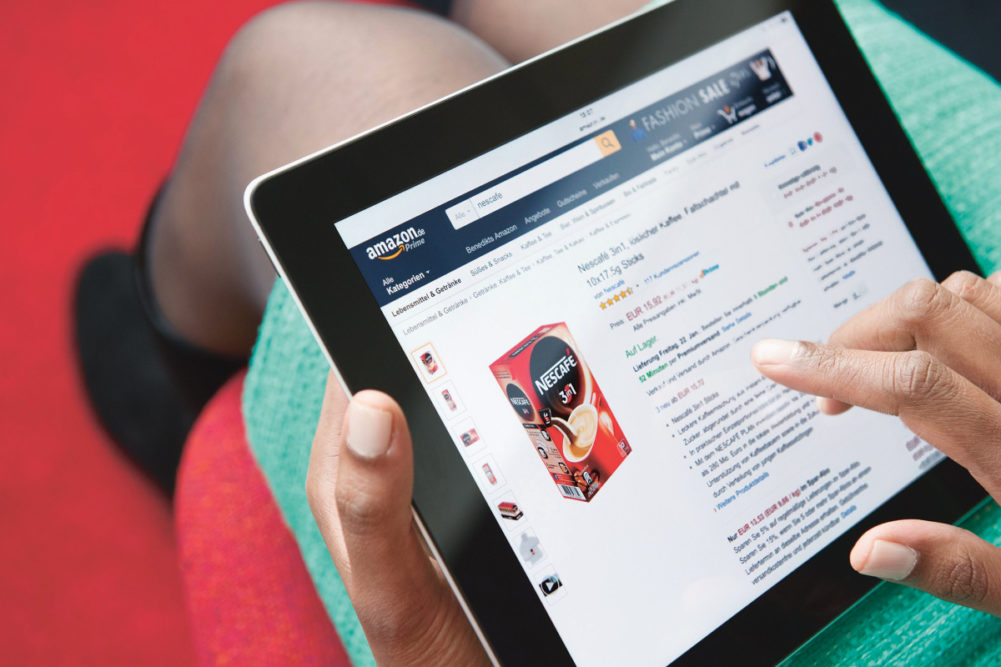VEVEY, SWITZERLAND — Nestle SA has bought in to the age of online purchasing. The company’s e-commerce sales increased 48% over the first nine months of the fiscal year to reach 12.3% of total company sales, which was up from 8.5% in the same time of the previous year.
While reporting nine-month sales on Oct. 21, Vevey-based Nestle upgraded its fiscal-year guidance to about 3% organic sales growth from about 2%.
“My view is now, this is the coming of age when it comes to digital in food and beverage,” said Ulf Mark Schneider, chief executive officer of Nestle, in an Oct. 21 earnings call. “As you know, beverage had been comparatively slow compared to other consumer categories in adopting more digital- and e-commerce-driven business, but now I think this is here to stay.”
COVID-19 accelerated the switch to online ordering, he said.
“People had to adopt this way of purchasing out of safety concerns and health concerns,” Mr. Schneider said. “Now that they see the convenience, we don't expect this to slide back even after the immediate pandemic is over. So all the more reason to give it continued effort, greenlight more investment in this area and be a leader in this space.”
Nestle is gaining market share online, said Francois-Xavier Roger, executive vice president and chief financial officer.
“In about 60% of our business sales online, we have improved and maintained our market share, and the interesting thing as well is in about two-thirds of the cases, we have a better market share online than offline,” he said.
The categories of coffee, pet care, nutrition and water are more relevant for e-commerce, Mr. Roger said, adding geographically Nestle’s online sales largely are coming from the United States, the United Kingdom, France, Germany, China and Japan.
Mr. Schneider added, “It's important that we do this always in line with local market customs because digital, it sounds like a one-size-fits-all, but there's lots of local flavors and local consumer preferences and also local players that you have to work with, and so we adapt to that. We try to avoid duplication by basically having a central toolbox and support system here, but it's important that we also let local markets have a strong voice in how they tailor those systems and apply them.”
Over the first nine months, Nestle’s total reported sales fell 9% to 61.9 billion Swiss francs ($68.2 billion) from 68.4 billion Swiss francs in the same time of the previous year. Divestitures and foreign exchange reduced total sales by 13%. Organic growth reached 3.5%. Purina PetCare, with organic growth over 10%, was the largest contributor.
COVID-19 affected at-home consumption positively and out-of-home consumption negatively. Retail sales had organic growth of 7%. Dairy, coffee at-home and Nestle Health Science, along with Purina PetCare, reported growth.
“I think what you're seeing here is genuinely people staying more at home, consuming more at home and also now getting settled into that habit, which I think is going to be here to stay with us for a while, and I think that bodes well generally,” Mr. Schneider said. “So I see it as something positive.”
Out-of-home sales, which accounted for about 10% of total Nestle sales before COVID-19, decreased 31%. The decrease moderated to 26% in the third quarter from 55% in the second quarter.
“We remain cautious as the channel may come under further pressure in the coming quarters should movement restrictions be reinstated in major markets,” Mr. Roger said. “Improvement in the out-of-home channel is expected to be gradual, with a recovery back to pre-COVID levels at the earliest in 2022.”
Nine-month sales fell for confectionery and water because of their exposure to out-of-home channels and on-the-go consumption.
In the Americas, sales of 25 billion Swiss francs ($27.5 billion) over the first nine months were down 9% from 27.6 billion Swiss francs in the same time of the previous year, but organic growth was 5%.
In North America, demand for Starbucks at-home products, Coffee mate and Nescafé lifted the beverages category to double-digit growth. Home-baking products, including Toll House and Carnation, also grew at a double-digit rate. Lean Cuisine returned to growth in the third quarter due in part to the launch of Life Cuisine.
In Europe, Middle East and North Africa, nine-month sales dipped 5% to 15 billion Swiss francs from 15.7 billion Swiss francs in the same time of the previous year. Divestitures, which included the Herta charcuterie business, reduced sales by 1.7%. Foreign exchange had a negative impact of 6%. Organic growth was 2.9%.
In Asia, Oceania and sub-Saharan Africa, nine-month sales declined 7% to 15.3 billion Swiss francs from 16.3 billion Swiss francs in the same time of the previous year. Sales in China decreased for the nine-month period although they turned positive in the third quarter. Organic sales were flat.
In Other businesses, which includes Nestle Health Science, sales dropped 23% to 6.7 billion Swiss francs from 8.7 billion Swiss francs, largely because Nestle divested Nestle Skin Health. Foreign exchange had a negative impact of 6%. Organic growth was 7%. Nespresso grew at a mid-single-digit rate.






